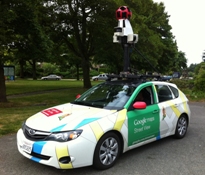Google Files Cert. Petition in Street View Case
 I noted back in October that Google had hired “noted Supreme Court advocate Seth Waxman” as it was preparing its petition for rehearing in the Street View case, “indicating perhaps how far they intend to take this.” (For background, see my earlier posts Part I, Part II, after the panel decision, and on the petition for rehearing.) My suspicions were accurate — after losing again at the rehearing stage in late December, Google has now filed a petition for certiorari, asking the Supreme Court to reverse the Ninth Circuit.
I noted back in October that Google had hired “noted Supreme Court advocate Seth Waxman” as it was preparing its petition for rehearing in the Street View case, “indicating perhaps how far they intend to take this.” (For background, see my earlier posts Part I, Part II, after the panel decision, and on the petition for rehearing.) My suspicions were accurate — after losing again at the rehearing stage in late December, Google has now filed a petition for certiorari, asking the Supreme Court to reverse the Ninth Circuit.
Google’s petition primarily makes the same substantive arguments it made in its petition for rehearing. The Ninth Circuit in the decision below adopted what I’ve called the “radio means radio” approach — “radio communications” in the Wiretap Act means only communications that you can receive with, you know, an ordinary AM/FM radio. I’ve argued that that is mistaken, and Google unsurprisingly agrees with me. Google provides three reasons why the Ninth Circuit’s interpretation cannot be sustained.

 You won’t find out from
You won’t find out from  I do intend to get back to my four-part series on whether Google’s collection of information from residential Wi-Fi networks violated the Wiretap Act. That issue is being litigated in the Northern District of California in a consolidated class action of home wireless network users, and the earlier posts in my series examined the plaintiffs’, Google’s, and the district court’s arguments on this issue. See
I do intend to get back to my four-part series on whether Google’s collection of information from residential Wi-Fi networks violated the Wiretap Act. That issue is being litigated in the Northern District of California in a consolidated class action of home wireless network users, and the earlier posts in my series examined the plaintiffs’, Google’s, and the district court’s arguments on this issue. See